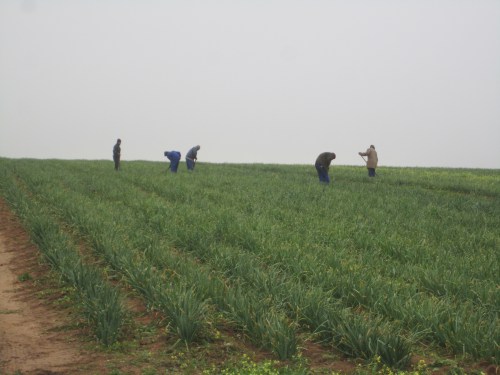Why Telephone Farming Does Not Work and Indians “Babysit” Their Businesses
The other day I decided to visit my neighbor’s farm after I got bored of chasing birds at my farm. This happens quite often, we visit each other at least every two days to encourage each other and trade “war stories”. I found that her French beans had just germinated, she had workers top dressing them, which is agricultural-lingua for applying fertilizer after the crop has germinated.
My neighbor and I chit chatted as we kept the workers company (supervised), and with time we realized that the ladies doing the top dressing were getting sloppy, getting some fertilizer onto the crops’ leaves and though the effect was not immediate, it would scorch the leaves. We went after them correcting this mistake, but also requested them to be a bit careful. Despite our request, they did not correct the mistake immediately, a few more rows had scorched leaves, and on our third request/order, the ladies were back on track doing the right thing.
This small incident led us to discuss why telephone farming does not work. See if she was a telephone farmer, she would have gotten a cheerful call from her worker in the evening informing her that the work was done and she should send money, only to show up days later on Saturday to realize that while the work was done, some of her crops are scorched. There are many other examples/experiences I could share; of diesel being sold by your workers, half of the fertilizer you buy being sold, your worker spending his time consulting for other farmers and neglecting your farm.
It is also the same with many Indian businesses in Kenya. I often wondered why the owner is always at the shop while he/she had enough workers and could hire a manager freeing his/her time to do other things. The explanation is that:
- They love enjoy running the business; and
- The businesses by their very nature demand owner oversight.
But we all know of corporations that are managed by employees, why can’t we replicate their systems in farming or retail businesses?
- Corporations can afford layers of managers that make it possible to have controls. In a farm, you have a farm manager and the line/casual workers. If the farm manager decides to use less fertilizer how can you control that? Poor yield can be an indicator, but the causes of poor yield are so varied, it would be hard to pin-point it to the 20kgs of fertilizer your manager sold. The most you can do is peg his remuneration to the yield, but even then you will be out of pocket if the yield is poor.
- Due to their size, corporations can bear/live with a certain level of loss. A simple example of this is printing paper. All employed people use their employer’s printer to do a little personal printing. It is a cost to the business, but it is not a big enough cost to run down the business. In an informal business, every item counts. A lost jembe (Kshs 900) is the equivalent of 3 days labour or fuel to irrigate 1 acre of land. In a retail business, 1 kg of sugar lost means no profit on the entire bag of sugar.
- Correcting mistakes in agriculture and informal businesses is sometimes impossible and fatal to the business. Before I started farming, I ran a hotel business; we had two hotels and I sat at the headquarters managing the two businesses. If a problem occurred with a guest or a room, it would be noted immediately, steps taken to rectify and unless it was grave, I would get to know about it after it had been resolved. In farming, problems aren’t noted immediately; using the wrong chemicals means waiting may be a week before noticing the chemicals aren’t working, then rectifying which will take another week or two. If you are not there to notice it, you are depending on a manager who is invested in the decisions he makes and is unlikely to admit a mistake when something goes wrong, so by the time he calls you to report the problem, it is often too late. Losing 3 weeks on a 12 week crop means definite losses.
Can an agriculture business grow to the level where it does not need owner oversight?
Yes it can. When a farmer is able to afford the controls a corporation has and to bear the minor losses a corporation suffers, then the owner can comfortably step aside. You could hire an independent agronomist to supervise spraying, fertilizer application and water levels and ensure he won’t collude with the manager.




2 Comments